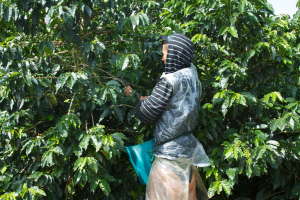After water, coffee is the most popular drink in the world. Coffee is also the world’s most produced product by volume that humans consume. The coffee industry makes a huge impact on the environment and the lives of millions of people. That’s why it’s so important to buy coffee that is fair trade or direct trade coffee and certified organic.

Ahh, coffee. Is there any better way to start your day? Photo Credit: Flickr
Organically grown coffee has a rich and delicious taste that sets it apart. It’s high in antioxidants and free from unwanted chemicals. Organic coffee, like the beans we select at Organic Mountain, has so many benefits for your health and for the environment. It also makes a positive impact on the lives of the farmers who grow it! When you go organic, you’ll feel great about every sip… and the taste will keep you coming back for more. Read on for our top 12 reasons to drink organic coffee:
12. Organic Coffee Is Free from Pesticide Residues
Coffee is sprayed with more chemicals than any other crop that humans eat. Following cotton and tobacco, coffee is the third most sprayed agricultural crop in the world. Whoa — that’s a big impact! The chemicals of conventional agriculture — pesticides, fungicides and insecticides — cause cancer and damage the human reproductive and nervous systems. Residues of these chemicals can still be present on non-organic coffee. Scary, huh?

A coffee worker shows off green coffee before roasting. Photo Credit: Flickr
All of the chemical residues going into a morning latte make your body feel worse. A high dose of pesticides will be acutely toxic. Long-term exposure to low doses can irritate the skin, cause headaches and cause allergic reactions. If you consume pesticides, severe consequences can emerge later in life including increased likelihood of Parkinson’s disease, depression, anxiety, and even ADHD. A cross-university study shows that pesticide residues have even been linked to a greater risk of miscarriages in some pregnant women as well. It’s a good idea to minimise exposure to pesticides as much as possible. If you’re a big coffee drinker, this may be your number one reason to go organic!
Remember: organic coffee isn’t covered with pesticide residues that harm your body.
11. Organic Coffee Is More Nutritious
Certified organic coffee contains vitamins, minerals, and antioxidants needed by the body. There are several health benefits associated with these nutrients, including:
- protection from cell damages
- immune system boost
- neuroprotective properties
Pure organic caffeine in strong coffee is an all-natural energy booster. It enhances brain function and the communication of neurons (brain cells). Organic coffee is better for you than energy drinks from the supermarket shelf. That’s because it’s free from sugar and artificial sweeteners. The vitamins and minerals found in coffee are easy for your body to absorb.Your body can digest nutrients found in organic coffee more easily than it can digest high energy drinks.
Remember: organic coffee has more nutrients than non-organic coffee. The nutrients found in organic coffee are easier to digest than those found in energy drinks.

When you buy organic, farmers are paid more than they would otherwise make. Photo Credit: mckaysavage via Flickr
10. Organic Coffee Is Easier on the Stomach
Coffee, like tea, citrus fruit juice and soda, is an acidic drink. While coffee will always have natural acids, the levels of acidity depend on how the coffee is grown and harvested. This impacts the final taste, as well as the effect on your stomach. It contains naturally-occurring acidity combined with the caffeine that the plant produces. Together they form an all-natural defence against insects and predators. A coffee strain with lower acidity typically has more caffeine to keep the pests away.
A coffee’s acidity level depends on the type of beans used to make it. However, there are lots of factors that can affect how acidic a particular roast or brew can be. Non-organic beans can have even higher acidity levels. This is because of unnatural additives and pesticides used on the coffee crop. If you’re the type of person who is prone to heartburn, or you get a stomachache after drinking coffee, there is hope. Switching to organic coffee will most likely help! Making cold brew coffee will also lower the acidity, resulting in a smoother cup.
Remember: organic coffee tends to have a lower acidity level because it takes longer to grow and develop. It is easier on the stomach because there are no pesticide residues.
9. Organic Coffee Fights Deforestation
Organic coffee does not promote deforestation. Conventional coffee may be grown on land that was once natural forest. Organic coffee practices help to conserve wildlife. This includes habitats for birds, primates, and native vegetation. Organic farming practices also prevent soil erosion. This leads to the best soil quality because it doesn’t leach pesticides into the soil. Instead, it uses natural composts and manures to enrich the soil’s nutrients.
Remember: organic coffee promotes responsible farming practices.
8. Organic Coffee Benefits Farmers’ Health
Non-organic coffee has negative effects on the hardworking communities that grow coffee crops. Farmers are exposed to high levels of chemicals in the soil and residues in the air.
When coffee crops are sprayed, the nearby communities end up breathing those chemicals. The chemicals then run off into local water sources. Non-organic coffee impacts and often ends up contaminating the wells and water sources of these communities. They then have to drink and wash with contaminated water. When you drink organic coffee, you’re not just helping your own body. You’re impacting the health of everyone who produced it!
Remember: chemicals sprayed on coffee crops hurt farmers and their families. Choose organic–it’s one way to protect farmers worldwide.

Buying organic impacts the health of coffee growers worldwide! Photo Credit: Flickr
7. Organic Coffee Pays Farmers a Living Wage
Organic Arabica coffee beans are free from residues, chemicals and artificial fertilisers. The farms certify product three times to guarantee high quality. The certifications include:
- Quality Assurance
- Fair Trade Alliance
- Smithsonian Institution
When products meet these standards, farmers make more money. This positively impacts their lives and the communities they live in.
Remember: organic coffee meets a high set of standards that help farmers to make more money.
6. Organic Coffee Fights Depression
When a person drinks coffee, caffeine stimulates their central nervous system. It acts as an antidepressant by elevating serotonin and dopamine — it’s even been shown to lower suicide rates. Organic coffee drinkers have a more euphoric mood boost. This could be because of the lack of chemical residue or the delicious taste. Maybe it’s because they’re impacting the world in a positive way!
Many coffee drinkers are self-medicating for depression without even realising it. This isn’t necessarily a problem. If you drink up to three cups a day and don’t over-caffeinate, coffee can help combat depression! The energy that coffee provides can combat the lethargic symptoms of depression. It can also stimulate conversation, helping people to be more sociable. We recommend that people disperse their coffee intake throughout the day, and always consult their doctor for any medical conditions.
Remember: organic coffee can elevate serotonin and dopamine, combat the lethargic symptoms of depression, and help depressed people to be more sociable.

Take a moment for yourself and your coffee…it can help you deal with the world. Photo Credit: dksesh via Flickr
5. Organic Coffee Increases Your Memory
Many of us are plagued by a feeling that we’re forgetting something. But recent research suggests that coffee may boost your memory! Scientists have known for years that caffeine enhances cognitive function. New research from an Italian university suggests that coffee helps strengthen memories and make them more resistant to decay. These effects are the most potent in 24-hour periods. (A great reason to drink coffee every day, right?)
Studies promote the benefits of caffeine, but you still need to be careful not to over-consume. Arabica coffee beans that are grown in the shade, instead of direct sunlight, grow slower and develop less acidity. This results in a smooth cup of coffee that’s less bitter, more well-rounded and easier on the stomach. Arabica beans also contain a bit less caffeine than other beans. This is one of the best ways to enjoy the optimal, healthy dose of caffeine that helps your brain. Go ahead and enjoy that second cup guilt-free!
Remember: coffee helps to strengthen memories and make them more resistant to decay.
4. Organic Coffee Lowers Risk of Parkinson’s Disease
Parkinson’s Disease is a progressive disorder that degrades the nervous system and affects millions of people worldwide, but modern science is giving people hope! New drug therapies are being developed, and lifestyle habits are also being studied. According to a Mayo Clinic study, it turns out that caffeine has a slight, positive effect on the treatment and prevention of Parkinson’s Disease.
Another study from John Hopkin’s University shows even more definitive, positive effects of coffee drinking upon the memory. Why does coffee help to prevent the symptoms Parkinson’s Disease? First, caffeine reverses Parkinson’s Disease by inhibiting damaged cells in the brain. These receptors control the body’s motor function. Damaged neural receptors create the shakes and tremors most associated with the disease. Research indicates that the antioxidants in coffee help repair cells.
Caffeine in the coffee increases motor-neuron activity. At the same time, it reduces motor deficits like tremors. Drinking one to three cups of coffee per day may help prevent and reduce symptoms. But keep in mind: it should be organic coffee. Pesticides such as organophosphates can actually contribute to Parkinson’s Disease! Choose organic — after one sip, you’ll never go back.
Remember: research suggests that the caffeine in organic coffee may help protect brain cells against Parkinson’s Disease.
3. Organic Coffee Lowers Risk of Stroke
There are lots of life choices you can make to keep you at a low risk of having a stroke. Good news: drinking coffee is reported to be one of them! The research currently available on strokes is impressive, especially among women. A study conducted by the Division of Nutritional Epidemiology in Stockholm, Sweden over a period of 20 years tracked people’s coffee drinking habits. It found a much lower risk of stroke among people who drank two to three cups of coffee per day. The results were even stronger among female participants.
Scientists don’t know the exact chemical compound that produces such a strong effect. But with coffee at its peak popularity, we think that the link will be discovered soon. In the meantime, we can all be confident in drinking our organic coffee. It tastes even better when we know that something about it might be reducing our risk of suffering a stroke.
Remember: coffee consumption is reported to lower the risk of stroke, especially among women.
2. Organic Coffee Protects Against Alzheimer’s
Research studies published by the University of Eastern Finland indicate that the naturally occurring caffeine in organic coffee may help prevent Alzheimer’s disease, too. In fact, they report a 65% decrease in the onset of Alzheimer’s Disease for people who drink two to four cups of coffee per day in patients who already have mild dementia. But, caffeine is not the only neuroprotective property of coffee. A 2018 study from the Krembil Brain Institute shows that a compound called phenylindanes are produced during the roasting process of coffee. Phenylindanes reduce the clumping of proteins in the brain. Read more here.
Getting organic coffee is important. The pesticide residue in conventional coffee can damage the myelin sheath, the part of the brain cell that helps send messages in your brain, so it is important that you consume organic coffee.
Remember: Drinking two to four cups of organic coffee per day may potentially protect you against Alzheimer’s.

Drink organic coffee — it’s the smart choice. Photo Credit: Edsel L via Flickr
1. Organic Coffee Tastes the Best!
Organic coffee farmers do not use herbicides, pesticides, and fungicides. This means they must learn to take better care of their coffee trees. These farmers take great care of their coffee plants and the environment. It means they work hard to get the same or better crop yields as their toxic competitors. This extra care results in coffee with more flavour!
Organic coffee often has a richer flavour. This is because it is usually grown at higher altitudes, where it takes longer to develop. It is higher in healthy antioxidants and contains more natural oils. The oil content creates that tasty crema that the coffee lovers go crazy for. Plus, when there’s no chemical residue, coffee has a cleaner and stronger taste!
Remember: organic coffee has a better flavour and a cleaner, stronger taste.
Don’t Panic; It’s Organic!
At Organic Mountain, we’re proud to offer certified organic coffee. Our employees are involved every step of the way to make sure the beans are grown, harvested, roasted and packed with love for our customers and the planet. We think it tastes better and we invite you to try it for yourself.


